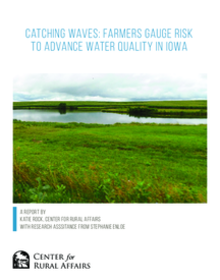This lack of clarity is particularly pronounced within agriculture. Many farmers feel they are under attack by urban stakeholders and environmental advocates. Such criticism creates social pressure on farmers to engage with Nutrient Reduction Strategy farm conservation practices. However, farmers face risks, real and perceived, to their production systems when adopting a new practice, and often need technical and financial support to counter those risks.
In early 2017, the Center for Rural Affairs received funding from the U.S. Department of Agriculture (USDA) Extension Risk Management Education exploratory grant program to study how Iowa farmers perceive production risks when transitioning to new production systems and social risks when failing to transition. Our objective was to understand how to best provide outreach and educational opportunities that can help farmers minimize risk while also engaging with Nutrient Reduction Strategy practices and water quality programming.
We utilized a farmer survey to identify specific Nutrient Reduction Strategy-related educational needs and demands. Throughout the survey process, we interviewed Water Quality Initiative leaders and Watershed Management Authority board members to provide additional insight into trends among farmers located in respective watersheds. We reviewed existing research, including farmer surveys from Iowa watershed projects, to further understand farmers’ risk management needs.
Our primary goal for this project was to inform a larger outreach and extension project. With better insight from farmers, outreach and education efforts for the Nutrient Reduction Strategy can be tailored to reduce farmers’ production and social risks.


